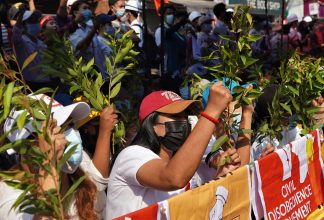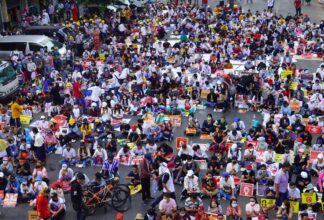Urgent Action Needed to End Escalating Violence in Burma
Today, Civil Rights Defenders signed an open letter to the Member and Observer states of the UN Human Rights Council. The letter calls for urgent action on the situation in Burma:
Dear Excellencies
We write to you regarding the deeply concerning situation in Myanmar, particularly in Rakhine State. Reports estimate that more than 270,000 Rohingyas have fled to Bangladesh following the outbreak of violence two weeks ago, and this figure is expected to significantly increase. Thousands of non-Muslim residents have also been internally displaced. Reports have also emerged of entire villages being burnt and hundreds killed. On 31 August, three UN Special Rapporteurs expressed concern citing credible reports of death to villagers resulting from security force attacks, and the use of helicopters and rocket propelled grenades on the population. On 5 September, speaking to reporters, the UN Secretary General warned of a risk of ethnic cleansing. Access to northern Rakhine State has been denied to independent observers and humanitarian aid agencies while media has been tightly controlled – leaving the territory under a virtual information blackout and exacerbating a humanitarian catastrophe. We call on the UN Human Rights Council to urgently act – by passing a resolution on Myanmar calling for an end to abuses against the population and ensuring immediate humanitarian access.
The UN Human Rights Council established a Fact-Finding Mission on Myanmar (FFM) at its 34th session in March this year, following reports of alarming human rights violations in Rakhine State beginning in October last year. In February 2017, a report by the Office of the UN High Commissioner for Human Rights (OHCHR) and statements by the UN Special Rapporteur on Myanmar referred to reports of egregious violations targeting the Rohingya minority at the end of 2016 and the beginning of 2017 – including the deliberate killing of children, the burning of homes with people inside them, rape, and sexual violence. The OHCHR report concluded that reports indicate the very likely commission of crimes against humanity. Military operations conducted during this period bear a close semblance to current operations which involve mass exodus of Rohingya fleeing violence, multiple reports of civilian deaths, and egregious violations under an information blackout, without independent access to observers or journalists.
The current bout of violence began following reports of coordinated attacks on police posts by the Arakan Rohingya Salvation Army (ARSA), an armed militant organisation, on 25 August – after which the Myanmar military launched a massive response. Weeks before the current outbreak of violence, on 11 August, the UN Special Rapporteur on Myanmar expressed concern on increasing military build-up in Rakhine State. The violence broke out immediately following the release of a report by an international commission headed by the former UN Secretary-General Kofi Annan, which called for reforms to address wide-ranging forms of discrimination faced by the Rohingya community. On 29 August, the UN High Commissioner for Human Rights cautioned all sides on fuelling further violence and called on the government leadership to condemn the inflammatory rhetoric and incitement to hatred that is proliferating. He further expressed concerns on unsupported government allegations that international aid organisations were complicit in or supporting attacks, as this places aid workers in danger and may make it impossible for them to deliver essential aid.
Myanmar has so far failed to restore full humanitarian access following the preceding period of violence that began in October 2016. The Myanmar government has hitherto been reluctant to cooperate with the FFM and has denied allegations relating to violations of international human rights law and humanitarian law. The government has also refused to reform discriminatory laws that affect the Rohingya community and deny them full citizenship rights, leaving the community in a vulnerable situation.
It is imperative for the UN Human Rights Council to urgently address the escalating situation in Myanmar through a resolution at the upcoming 36th session of the UN Human Rights Council. The establishment of the FFM was considerably delayed for technical reasons. The lack of access to the country by independent investigators as well as the current outbreak of violence have further increased the magnitude of the body’s work ahead of its March 2018 reporting deadline. In this context, the Council should pass a resolution on Myanmar which:
- Extends the time available for the FFM beyond March;
- Makes provision for the FFM to provide a preliminary report to the UN General Assembly in September 2017 and a final report to the UN Human Rights Council and the General Assembly in 2018;
- Calls on Myanmar to urgently grant full access to the FFM;
- Emphasises the responsibility of Myanmar to prevent and seek accountability for any retaliation or reprisal against individuals for engaging with the FFM;
- Expresses grave concern over recent allegations of violations and calls for an immediate end to attacks on the civilian population; and
- Urges full access for humanitarian aid and independent observers.
Please accept the assurance of our highest consideration.
Signatories
1. ALTSEAN-Burma (Alternative ASEAN Network on Burma)
2. ASEAN Parliamentarians for Human Rights (APHR)
3. Asian Forum for Human Rights and Development (FORUM-ASIA)
4. Asian Legal Resource Center (ALRC)
5. Awaz Foundation Pakistan – Centre for Development Services (AwazCDS-Pakistan)
6. Burma Campaign UK
7. Bytes for All, Pakistan (B4A)
8. Cairo Institute for Human Rights Studies
9. Centre for Human Rights, University of Pretoria
10. Christian Solidarity Worldwide (CSW)
11. CIVICUS: World Alliance for Citizen Participation
12. Civil Rights Defenders
13. Commission for the Disappeared and Victims of Violence (kontraS)
14. Commonwealth Human Rights Initiative
15. Conectas Direitos Humanos
16. Defend Defenders (the East and Horn of Africa Human Rights Defenders Project)
17. Egyptian Initiative for Personal Rights
18. FIDH – International Federation for Human Rights
19. Global Centre for the Responsibility to Protect
20. Human Rights Watch
21. Human Rights Working Group (HRWG)
22. INFORM Human Rights Documentation Centre
23. Informal Sector Service Center (INSEC)
24. International Service for Human Rights (ISHR)
25. Judicial System Monitoring Program (JSMP)
26. Korean House for International Solidarity (KHIS)
27. Madaripur Legal Aid Association
28. National Commission for Justice and Peace, Pakistan
29. Odhikar
30. Partnership for Justice
31. People’s Empowerment Foundation, Thailand
32. People’s Vigilance Committee on Human Rights (PVCHR)
33. PILIPINA Legal Resources Center (PLRC)
34. Pusat KOMAS
35. Refugee and Migratory Movements Research Unit
36. Safeguard Defenders
37. South India Cell for Human Rights Education and Monitoring (SICHREM)
38. Suara Rakyat Malaysia (SUARAM)
39. Think Centre
40. Unitarian Universalist Service Committee

